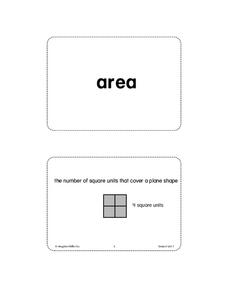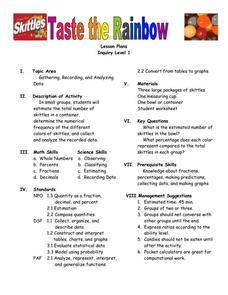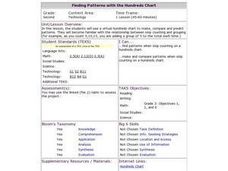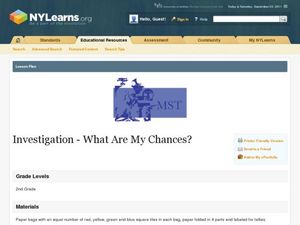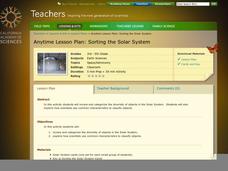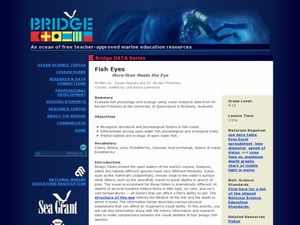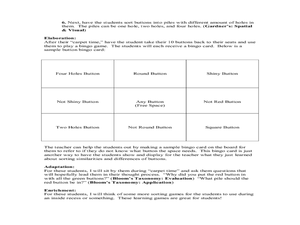US Department of Agriculture
Serving Up My Plate
Offer your youngsters an extra helping of nutritional knowledge and healthy tips with this resource, which centers around the MyPlate nutritional guide and offers three "courses" of plans and worksheets on the food groups and the...
Curated OER
English Exercises
For this recognizing animal names reading worksheet, 1st graders name 10 animals. A word bank of the animal names is provided and students must write the name to match each animal picture.
Curated OER
Government Mobile
Fourth graders, after studying the three branches of state government and gathering together a variety of art materials, create a mobile explaining all three branches of the government. They display their mobiles inside the classroom for...
Curated OER
Learning to Use a Scale
In this scale worksheet, students measure items on a scale, and read examples. Students complete 4 questions on their own about scale measurement.
Houghton Mifflin Harcourt
Unit 4 Math Vocabulary Cards (Grade 1)
Support math vocabulary using a set of 25 flashcards. The set consists of a variety of bold-faced word cards and corresponding labeled picture cards. Terms include even numbers, regrouping, skip counting, and more.
Houghton Mifflin Harcourt
Unit 7 Math Vocabulary Cards (Grade 2)
Reinforce math vocabulary instruction with a set of flash cards. Fifty-six cards offer either a bold-face word or a picture representation equipped with descriptive labels. Terms include centimeters, gallons, square units, and more!...
Curated OER
The Spread of Aids
This is an effective simulation of how communicable diseases such as AIDS can be spread throughout a population. Classmates exchange samples from their individual cups of liquid: one of them containing a dilute NaOH solution, and the...
Dick Blick Art Materials
Peace Windows
Peace, love, tolerance, faith. Marc Chagall's Peace Window in the United Nations World Headquarters serves as a model for young artists as they create their own peace-themed transparent paintings. A great activity for both SPED and...
Curated OER
Breaking Barriers
Determine how African-Americans have broken barriers in this history activity. Middle schoolers discuss the 15th Amendment and the American civil rights movement prior to analyzing Barack Obama's speech "A More Perfect Union," taking...
Curated OER
Observation and Inference
Assess your young scientists' understanding of the difference between observation and inference with this 20-question multiple choice quiz. It reviews a variety of physics and astronomy concepts, such as solar eclipses and sunspots, the...
Curated OER
In Between
In this in between 26 and 61 worksheet, young scholars color all of the numbers that come between 26 and 61 yellow and all other numbers pink. Students have 12 numbers to color.
Curated OER
Taste the Rainbow
Students practice estimating and graphing by utilizing Skittles. In this statistics lesson, students complete worksheets based on the likelihood of a certain color of skittle coming out of the bag. Students create a graph...
Curated OER
Counting by Tens
First graders listen to "One Is a Snail, Ten Is a Crab", a story about a crab with ten feet and counting by tens. They create their own crab to practice counting by tens to one hundred.
Curated OER
Finding Patterns with the Hundreds Chart
Students review their numbers up to one hundred. Using a chart, they compare and predict patterns that might be in the numbers. They practice skip counting and grouping numbers. Using a spreadsheet, they graph different sets of numbers...
Curated OER
Duck Addition
In this addition worksheet, learners solve a set of 40 problems, coloring spaces with a number 5 to create a path for the "duckling to get to the pond." An answer key is included.
Curated OER
Sight Words
Use this resource to help your class practice site words. This presentation, featuring one hundred and twenty-three sight words, could be used at a center.
Curated OER
Variation in Human Skin Color
Students classify themselves according to the six skin types. In this biology lesson, students explore the causes of human skin variation. They present their findings in class.
Curated OER
Investigation--What Are My Chances?
Seventh graders investigate theoretical and experimental probability by conducting a series of experiments with multiple trials, comparing results, combining results and making conclusions. They express probabilities as fractions,...
Cornell University
Predicting Chemical Reactions
Prove the Law of Conservation of Mass through a lab investigation. A well-designed lesson asks groups to combine materials and monitor indicators for chemical reactions. Measuring the mass of the reactants and products allows individuals...
Curated OER
Probability: What's Most Likely?
Work with graphs, tally marks, and probability. Fifth graders read tables with different sets of data, including tally marks and a bar graph, to answer five questions. Use this worksheet as part of a probability lesson, or as a homework...
California Academy of Science
Sorting the Solar System
Scientists are always sorting and classifying objects based on their characteristics. In a hands-on learning activity, young space explorers work together to categorize solar system cards based on their properties. It is up to the...
Curated OER
Valentine Marbles
if you've ever had to guess how many items were in a jar, then this problem is for you! With a big jar full of red and white marbles, does picking a sample of 16 allow your learners to get a good estimate on the percentages of each...
Curated OER
Fish Eyes - More than Meets the Eye
Inform your class about the adaptations in fish eyes: cones, lens size, endothermy, and speed of vision. The adaptations are related to diving behavior. Junior marine scientists compare the adaptations of four different fish species to...
Curated OER
Grouping Buttons
Looking for a good lesson on counting and sorting? This lesson is worth a look! For this classification lesson, learners sort buttons by color, shape, shiny verses not shiny, or number of holes.







